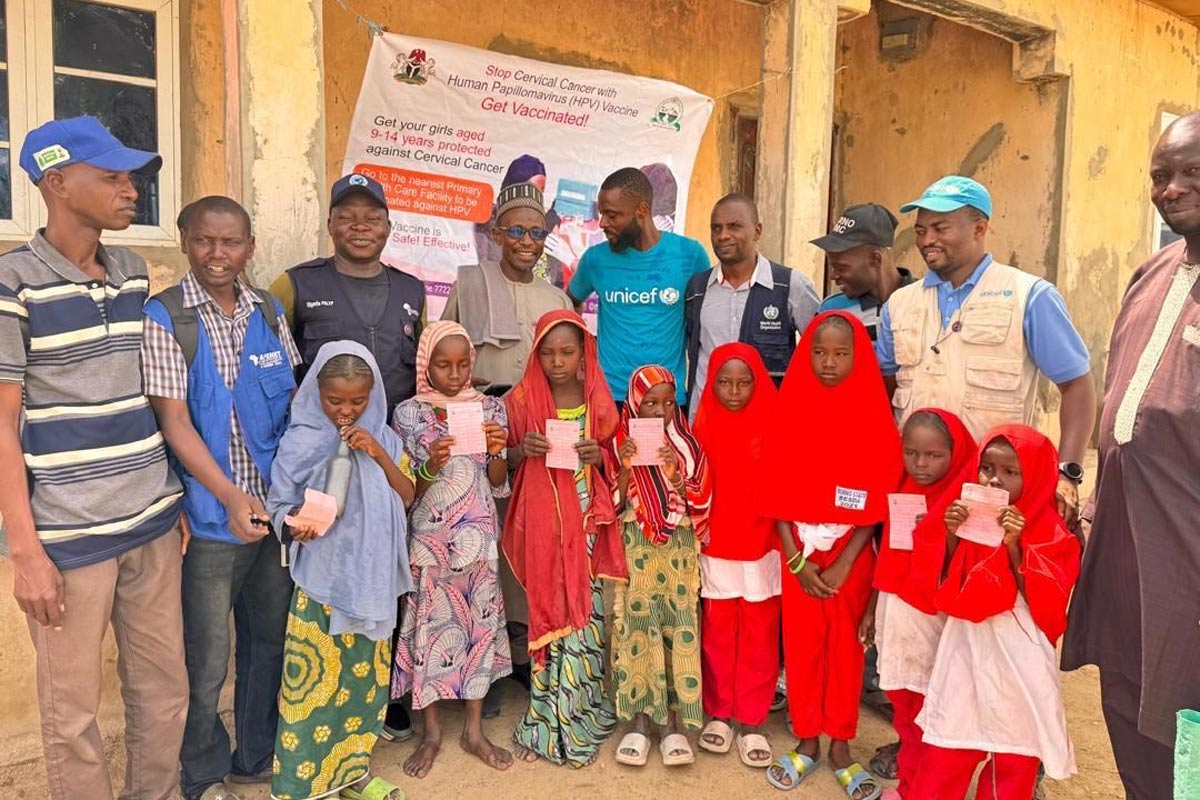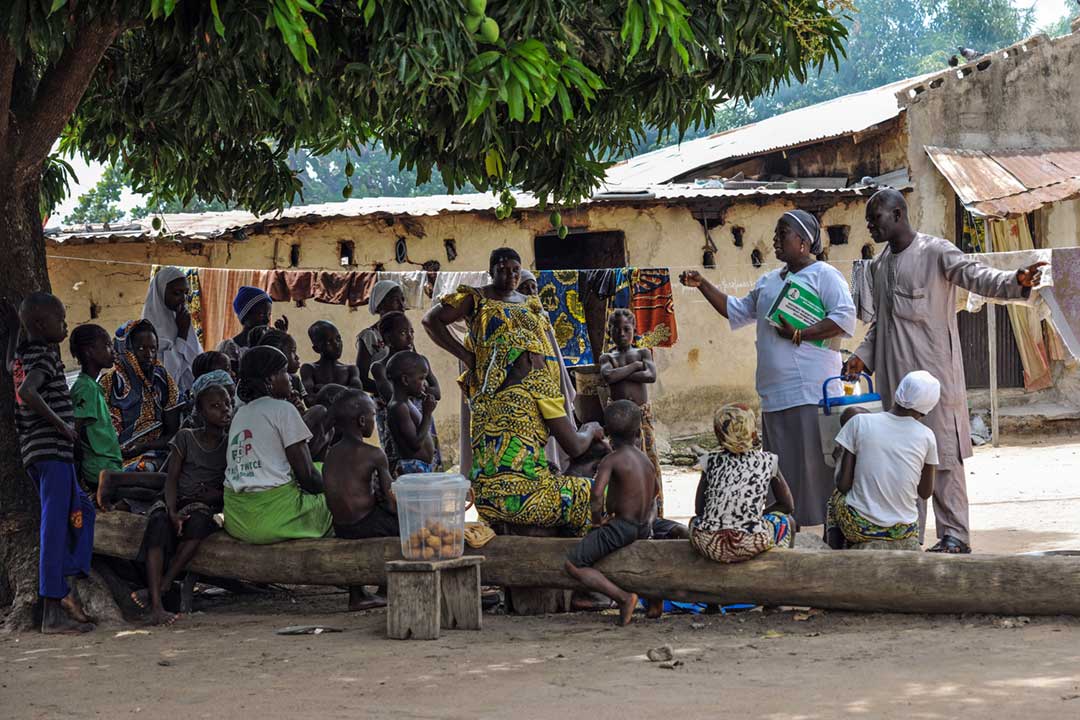Nigeria is facing an antimicrobial resistance crisis. A growing cadre of “health champions” is fighting back
The Ebola outbreak that killed her aunt, leading infectious disease physician Dr Ameyo Stella Adadevoh, was a “wake-up call”, says Niniola Williams, who leads an organisation recruiting AMR champions in the community.
- 17 January 2025
- 5 min read
- by Zubaida Baba Ibrahim

Although Nigeria faces one of the highest global burdens of antimicrobial resistance (AMR), experts fear the phenomenon remains largely unrecognised in many Nigerian communities.
That heightens the risk, as limited access to health facilities, a scarcity of skilled medical professionals and the easy availability of overprescribed or unprescribed antimicrobial medications create ideal conditions for the increasing dominion of drug-resistant – and therefore difficult-to-treat – pathogens.
According to 2019 data, Nigeria ranks 20th out of 204 countries by age-adjusted AMR mortality rates, and registered 263,400 AMR-linked deaths that year alone. That means that more Nigerians died from conditions related to drug resistance than died of malaria, respiratory infections, or cardiovascular diseases.
“Looking at the way the [AMR] pandemic has been ravaging the whole world, but nobody is really talking about it, for us, we felt that there was a need to step in because we are looking at what is going to happen when it gets to a point that we don’t have effective antimicrobial drugs to use to treat the most basic infections.”
- Niniola Wiliams, Managing Director of DRASA Health Trust
But the Nigerian government – which launched the first National Action Plan (NAP) on AMR in 2017, and is currently pursuing NAP 2.0 – is not alone in the fight against drug resistance. One organisation taking up the struggle against the alarming lack of public awareness of AMR is the DRASA Health Trust, named in honour of the late Dr Ameyo Stella Adadevoh, who lost her life to Ebola in 2014 after weeks of battling the epidemic on the frontlines.
Championing for health
DRASA Health Trust was founded in 2015 with the mission to alleviate the burden of preventable infections in Nigeria. “We felt that what happened during the Ebola [outbreak in West Africa] was a wake-up call for our health system,” said Niniola Williams, who is the Managing Director of DRASA Health Trust and the late Dr Adadevoh’s niece.
“We wanted to take a systematic-level approach to supporting the health sector to be better: to ensure that everyone who seeks care gets quality and safe care, and to ensure health workers are supported in the work they are doing – especially those on the frontline.”
According to Williams, AMR is a crisis comparable to Ebola. “Looking at the way the [AMR] pandemic has been ravaging the whole world, but nobody is really talking about it, for us, we felt that there was a need to step in because we are looking at what is going to happen when it gets to a point that we don’t have effective antimicrobial drugs to use to treat the most basic infections.”
One strategy Williams’s team uses is recruiting “health champions” – community members trained to advocate for proper antimicrobial use, and to educate their fellow citizens on the dangers of AMR, while also touting local-level solutions to the AMR challenge.
These champions come from a diverse array of backgrounds, from government officials to secondary and university students, to youth groups and other prominent community influencers. “Influencers can be anybody, from the head of the butchers’ association to a religious leader,” Williams emphasised.
The health champions attend participatory training sessions to level up their technical knowledge. Ifeyinwa George, a pharmacist by background and the AMR Programme Manager at DRASA Health Trust, says that these sessions allow for participants to practise as they learn.
“We also believe in community-led initiatives. We do not just go into communities, engage them and leave: we want community participation. So, basically, we want initiatives we bring to be led by the community’s key influencers, who can champion the cause,” Ifeyinwa explained.
The organisation also takes advantage of peer-to-peer learning, particularly in the context of secondary schools. At present, DRASA Health Trust has 2,000 dedicated AMR ambassadors in 30 secondary schools across Nigeria and continues to expand.
But Ifeyinwa believes that the key to tackling the burden of AMR in Nigeria and beyond lies in preventing the spread of infectious diseases, thereby reducing the need for antimicrobial drugs in the first place. That means that training sessions for health champions often focus on the best practices for disease prevention, such as hand hygiene and promoting immunisation.
Have you read?
Further to go: tackling AMR in Nigeria
Nigeria’s first NAP for AMR, which was launched in 2017 and ran until 2022, could boast only a 44% completion rate. While the country made some progress in addressing AMR, particularly in education and training, gaps included weak involvement from sectors such as environment, agriculture and animal health. Additionally, the plan lacked specific milestones, targets and a clear budget, according to an official assessment.
NAP 2.0 is aiming at plugging those gaps and remedying the challenges faced by its predecessor, and DRASA Health Trust is keying into it. “Our model is to work from the top down to the bottom up – and for AMR we know it's a One Health problem. We know the animal sector, the environment, the plant and human health are all linked,” Williams explained.
She added that the complexity of AMR demands a tailored approach, especially in a diverse country like Nigeria. Hence the organisation joined up with the government to support development of the second national policy, outlining key priorities to tackle AMR. This included conducting a situational analysis to understand the scope of the problem, identifying hotspots with high AMR prevalence, developing a budget to support AMR initiatives and establishing an accountability and monitoring framework to track progress and evaluate effectiveness.
Patients and medics’ behaviours add to AMR risk
But even as DRASA Health Trust builds up its cadre of champions at community level, widespread habits of medical prescription and consumption continue to imperil progress.
The unchecked prescription of antibiotics and other antimicrobial medications, coupled with the ease of over-the-counter purchases without a prescription, is significantly contributing to the growing burden of AMR in Nigeria, physicians explain.
Dr Najeeb Umar, a family medicine specialist, says that many patients are unreceptive to the efforts of health workers to explain AMR-preventing practices.
When patients are not prescribed antibiotics by healthcare providers, they often resort to purchasing them over the counter from pharmacies or local medicine stores, said Dr Umar. While he emphasises the need for stricter policies to curb the misuse of antibiotics, suggesting they be classified as highly controlled drugs requiring prescriptions, he also urges health workers, especially pharmacists, to step up and take responsibility for the fight against AMR.








